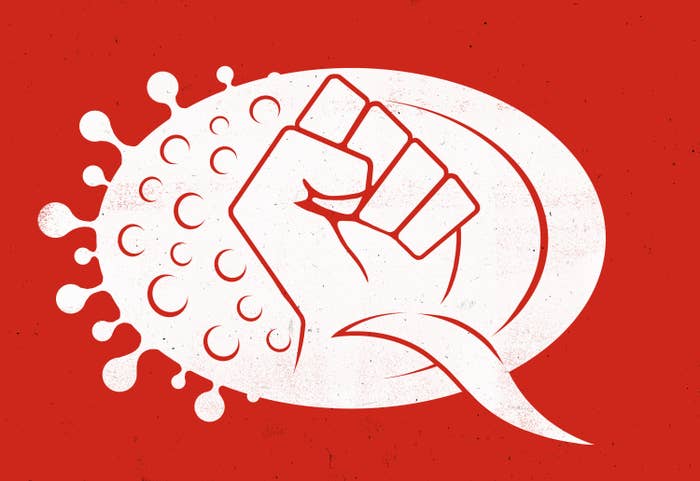
This is Quibbles & Bits, a newsletter from the BuzzFeed News copydesk. You can sign up here.
This year, anything that had previously been a small, personal decision — going for a walk, ordering takeout, getting groceries — became a heavy ethical dilemma. No industry has been untouched by this moment in time, no life unchanged in some form. And this collective disruption meant our vocabulary changed with it.
Considering this year in retrospect, the BuzzFeed News copydesk wanted to look at three specific events that shaped our language in 2020: the coronavirus pandemic, the racial justice movement, and the ascendance of the QAnon mass delusion and militant groups to the mainstream discourse.
The coronavirus pandemic
In the early stages of the coronavirus outbreak, our daily lexicon was inundated with new terms, and misinformation about the virus was rampant. We needed to make sure we were writing as clearly and accurately about the coronavirus as possible — for example, using a definite article in front of it: “the novel coronavirus.” This was because we were referencing the current pandemic and a specific strain of coronavirus (rather than the whole family of coronaviruses). We don't use “the” when talking about COVID-19 because that's the specific disease's name. And we wouldn't use “the” in front of SARS-CoV-2, which is the name of the strain of the coronavirus, either. Eventually you started to see the “-19” suffix dropped from “COVID” or the definite article left out of “coronavirus.”
Earlier in the year, when COVID-19 was still a new term, we needed to clarify that COVID-19 was “the disease caused by the novel coronavirus.” Colloquially, people soon abandoned any semblance of an appropriate tone; the virus became “the ’rona.” Back in April, the copydesk wrote at length about the semantic difference between "safer at home" and "shelter in place" as well as that between "quarantine" and "isolation"; on social media, people just started abbreviating it to “quar.”
Additionally, the racist trend of referring to the disease as the “Chinese virus,” a practice encouraged by the president, was smothered. As we wrote then, it’s an attempt to politicize language about an illness that is a global crisis, to place blame when lifesaving action is what’s needed.
More subtly, it was a year of constantly checking in on others’ safety. The common practice now is to wish someone a “safe” and “healthy” holiday before a “fun” one. Hearing our moms' own perpetual “stay safe” reminder on phone calls absolutely hit different in 2020. Asking anyone the mundane, rhetorical question of “How are you?” was inevitably going to elicit a sarcastic, insincere response. “How is anyone?”
Racial justice protests
After the police killings of George Floyd and Breonna Taylor, millions protested systemic anti-Black racism in the US this summer. This reckoning extended into our language, naturally, with changes to terminology about marginalized groups and how we discuss protesting in general.
The president and other politicians were critiqued for using the word “riot” to describe the demonstrations happening in the streets — especially when peaceful protests were often met with violence from police. The protests also popularized the phrase “defund the police” — a concept that requires unpacking (Does it mean making federal funding conditional on reforms? Redirecting some funding to community programs? Taking away all funds from police departments and starting over?) and has often been confused with “abolishing the police.”
As demonstrators toppled Confederate statues and lawmakers removed racist symbols from flags, there were also initiatives to erase references to the country’s history of slavery in everyday language. Voters in Rhode Island chose to remove “and Providence Plantations” from the state’s official name. Tech companies like Twitter and Apple stopped using the terms “master,” “slave,” “blacklist,” and “whitelist” in programming codes. The movement extended to pop culture, with country band Lady Antebellum changing their name to remove its associations with slavery and the Civil War (but getting into a legal battle with a Black blues singer in the process), and the Chicks dropping the “Dixie.”
And the Associated Press Stylebook began capitalizing "Black" to convey the “essential and shared sense of history, identity and community among people who identify as Black,” a style decision that many news outlets subsequently followed. Prior to this summer, the change had already been adopted by some publications and the National Association of Black Journalists.
QAnon and militant groups
Still other movements followed an unsettling, sometimes frightening, trajectory in 2020. As QAnon emerged from the shadows to become mainstream, we realized we needed to find a more accurate term than the singular “conspiracy theory” to describe this convoluted entity. As we noted in the September issue of our Quibbles & Bits newsletter announcing that we would be calling it a “collective delusion,” QAnon comprises a mass of people who subscribe to a shared set of values and debunked ideas, which inform their beliefs and actions. And although people who identify as QAnon followers may be unaware of its true depth or are conflating it with a demonstration of support for Donald Trump — who has himself praised it and is viewed by some as a savior figure in what has been compared to a new religion — QAnon’s belief system has inspired crime and violence, leading the FBI to label it a domestic terrorism threat.
The phrase “domestic terrorism,” and an apparent reluctance to use it to describe extremist attacks perpetrated by white Americans against civilians in the US, was the subject of vigorous debate in 2020. Many zeroed in on the word “militia” after six men were charged with plotting to kidnap Michigan Gov. Gretchen Whitmer. The day after their arrest, the governor herself tweeted: “They’re not ‘militias.’ They’re domestic terrorists endangering and intimidating their fellow Americans. Words matter.”
Indeed. So it’s frustrating that Merriam-Webster’s dictionary itself offers several definitions for “militia” — notable for their inconsistency. In fact, one definition is the precise opposite of the others.
In response to the “militia” debate, particularly the opposition to using it because of the belief that it connotes nobility or valor or confers legitimacy on groups that are motivated by hatred rather than patriotism, we researched and discussed alternates. One, “militant” and “militant group,” we advised in our style guide to use instead of “militia” when referring to an armed extremist or group (a decision we will likely revisit). Other terms that came up included “right-wing militant,” “armed extremists,” “armed civilians,” and, when applicable, “armed men.”
But historian Kathleen Belew, who has chronicled the rise of white power activism, addressed what she called “the sudden pushback/confusion about the use of the word ‘militia’” in an October Twitter thread, arguing that “it's important to use it.” “I worry that the push to qualify definitions might create the idea of good, or neutral militias that ARE legitimate,” Belew said. “These are not. They are not neutral observers. They are not keepers of law and order. They are paramilitary groups.”
But what of self-styled militia groups who are simply demonstrating and not committing acts of violence? “Militias, according to all the reporting I have read over the last several years, come in various sizes and shapes,” Detroit Free Press editor Peter Bhatia wrote in affirming the guidance from USA Today's standards editor: "Avoid the terms militia or guard to describe an armed group of people. They may be using the term to convey authority they do not have.”
“Some are just guys roaming around the woods shooting their rifles,” Bhatia said. “All have a distrust of government and authority, and a few pursue that distrust to violent extremes.”
Ultimately, we agreed that use of “militia,” rather than being a catchall, requires judgment — with the goal, as always, to be thoughtful and precise.
More than anything else, 2020 showed that we need to get rid of pretense in our language. We need to pull back the semantic facade, be critical of labels, and call things what they are: QAnon is not just a theory, it's a mass delusion; armed men with a plot to kidnap a governor are not a militia, they're domestic terrorists; and an elected official who routinely disregards the truth and deceives the public isn't “gaming in falsehoods” or “sharing false claims” — they are lying.


